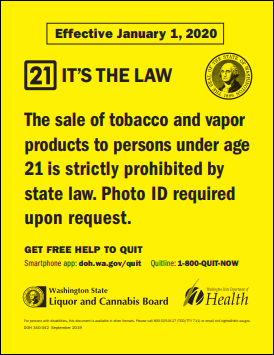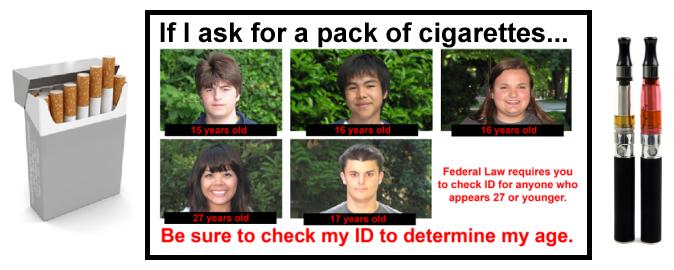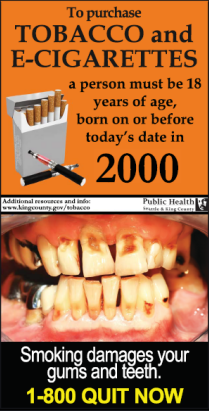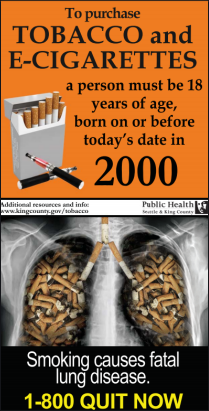Tobacco laws and resources for tobacco retailers
- Regulation of smoking in public places and places of employment, King County Board of Health Code, Title 19
Places restrictions on the use of tobacco products, electronic smoking devices, and unapproved nicotine delivery products to further protect those who live, work, and visit King County. Elements of the regulation include:
- Prohibits smoking and the use of "electronic cigarettes/vapor products" in all places where smoking is prohibited by state law
- Clarifies the definitions of "public place" and "place of employment"
- Increases fines for large event venues with a capacity of over 1,000 people
- Smoking in public places, Washington state RCW 70.160:
Prohibits smoking in public places and workplaces and requires that smoking occur a minimum reasonable distance of 25 feet from entrances, exits, windows and air intakes to insure that smoke does not enter into buildings.
- Prohibition on use of tobacco products on school property, RCW 28A.210.310
- Prohibition on use of tobacco products on school property, RCW 28A.210.310
- Report a violation if you see someone smoking or using an electronic cigarette/vaping device in a public place or place of employment.
- Sale and availability of tobacco products and vapor products, King County Board of Health Code, Title 19
- Tobacco 19.04
- Vaping/electronic smoking devices 19.12
- Washington state laws and regulations: Sale
- Tobacco – Access to minors, RCW 70.155
- Sale and distribution of tobacco products, WAC 314-10
- Cigarette and tobacco products license process, WAC 314-33
- Cigarette and tobacco products violations, WAC 314-34
- Selling or giving tobacco to minors, RCW 29.28.080
- Report a violation if you witness retailers selling tobacco or vapor products to underage children
Laws and regulations covering the sale of tobacco and vapor products
Born before date sign
The best placement for these signs is on or near the register facing your clerks, NOT facing the customer. Click on the images or the text link below to download and print:
Acceptable forms of identification for tobacco sales
Watch a streaming video for Washington State retailers who sell tobacco products.All forms of acceptable Identification must have the person's picture, name, address, date of birth, physical description, and signature. Acceptable forms of ID include:
- Drivers license, drivers permit or identification card issued by any state in the US or Canadian Province
- US Military ID card
- Passport
- Some Tribal IDs are now acceptable
- A merchant marine ID card (issued by US Coast Guard)
If you think the ID is not valid, you have the right and responsibility to refuse selling the tobacco product. Don't forget to check the expiration date. If you are interested in obtaining information about other states' IDs, please call us at 206-263-8271. You can also visit the Department of Licensing's website about ID card designs.
- Temporary paper IDs or driver licenses are only acceptable if accompanied with the previous (valid or expired) ID/license.
- A punched WA State driver license is still considered an acceptable form of ID as long as it is not expired. This happens when a person can no longer drive, but can still use the license for ID purposes.
Checking ID
Don't be afraid to ask everyone for identification. Your customers will understand and appreciate your efforts to keep tobacco out of the hands of minors. Checking ID is a critical step refusing to sell tobacco to minors. In fact, clerks that ask for ID are almost six times more likely to refuse to sell tobacco to a minor. Don't take any chances - always ask for ID to make sure the customer is 18 or older.
Checking identification is easier than you might think. The key is to become familiar with the different types of ID's that you will be checking.
Here’s a quick and easy-to-read form that details what to look for when checking someone's ID. You can review it here, or print it out and keep it by your register: Checking ID Guide.
FDA regulations
On June 22, 2010, the Food and Drug Administration (FDA) published a rule that restricts the sale, distribution, and marketing of cigarettes, cigarette tobacco, and smokeless tobacco products to protect children and adolescents. The rule is required by the Family Smoking Prevention and Tobacco Control Act and is intended to protect kids by making tobacco products less accessible and attractive to them.
On June 22, 2009, President Barack Obama signed into law the Family Smoking Prevention and Tobacco Control Act, giving the U.S. Food and Drug Administration (FDA) comprehensive authority to regulate the manufacturing, marketing, and sale of tobacco products.

 Translate
Translate



